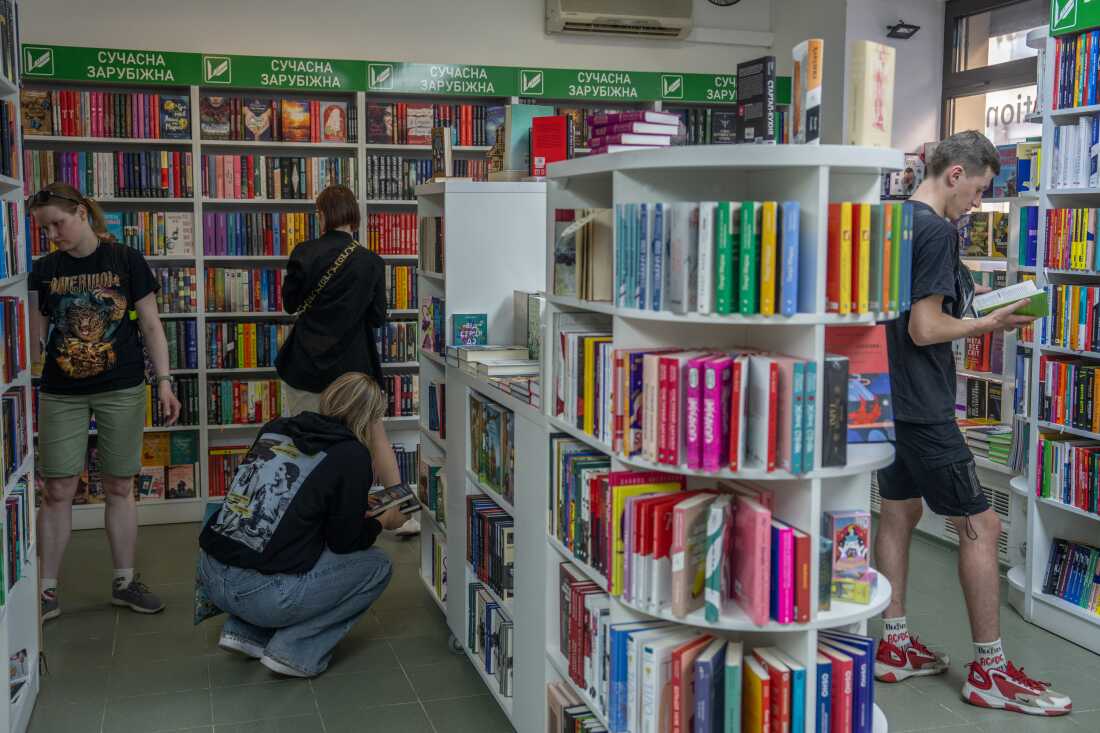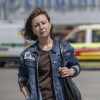
Scenes of destruction on the Issue Druk printing home, certainly one of Ukraine’s largest, could be seen days after it was hit in a Russian missile assault on Might 27.
Laurel Chor for NPR
disguise caption
toggle caption
Laurel Chor for NPR
KHARKIV, Ukraine — After a Russian missile strike in Might, certainly one of Ukraine’s largest book-printing crops seemed like a bloodbath.
Seven workers have been lifeless, with greater than 20 wounded, their blood on the partitions that had not blown aside. And underneath a caved-in roof lay tens of hundreds of charred books and printing equipment in smoldering heaps.
“Most of the books were ours,” says Artem Litvinets, editor-in-chief of Vivat, a significant Ukrainian publishing home. “The attack felt methodical and deliberate, like cultural genocide.”

The Russian missile assault in Might on Issue Druk printing home, in Kharkiv, Ukraine, induced casualties, tore via the roof and left books and equipment charred.
Laurel Chor for NPR
disguise caption
toggle caption
Laurel Chor for NPR
About 80% of Ukraine’s books are printed in Kharkiv, the nation’s second-largest metropolis, which is simply 20 miles from its northeastern border with Russia. Publishing has thrived whilst Kharkiv has been underneath fixed assault since Russia launched its full-scale invasion in February 2022.
The Ukrainian Ebook Institute informed NPR that bookstore chains have opened dozens of recent shops up to now yr alone and that unbiased bookshops corresponding to Sens, in Kyiv, are thriving. Ukraine’s largest bookstore chain added 22 new shops in 2023 and plans so as to add one other 22 this yr. Litvinets says Vivat, which is predicated in Kharkiv, has doubled its workers and guide inventory for the reason that struggle started and tripled the variety of bookstores from three to 9.
“And now, with all the power cuts, when there’s no electricity or internet, books are even more popular,” he says. “People read them by flashlight or candlelight and escape into another world.”

Artem Litvinets, the editor-in-chief of the Vivat publishing home, poses for a portrait in a park in Kharkiv, Ukraine, on Might 26.
/Laurel Chor for NPR
disguise caption
toggle caption
/Laurel Chor for NPR
Litvinets says mysteries and romantic fiction are particularly in style; Ukrainian authors are in excessive demand.
“Since the war, there’s this interest in everything Ukrainian,” he says, “and that includes Ukrainian literature.”
‘Don’t cease! Survive!’
Inside certainly one of Vivat’s bookstores in Kharkiv, Kuzma Zhytnyk, an 18-year-old economics pupil, is perusing the colourful, well-stocked cabinets. He says testing the most recent releases on the bookstore is a part of his on a regular basis routine.
“I love sitting on the sofa at home and leafing through a book,” Zhytnyk says. “It drives away bad thoughts.”

Folks peruse the bookshelves on the bookstore of Vivat, certainly one of Ukraine’s largest publishing homes, on Might 26. A printing home utilized by Vivat was hit by a Russian strike a couple of days prior, killing seven staff.
/Laurel Chor for NPR
disguise caption
toggle caption
/Laurel Chor for NPR
He selects the Ukrainian-language version of Why Nations Fail by Daron Acemoğlu and James Robinson. Zhytnyk always worries about what’s going to occur to Ukraine, he says, and wonders if it’ll lose its sovereignty and outlined borders in addition to “a national idea that holds everyone together.”
“In order to save the country, we need to save our minds,” he says.
Although many in Kharkiv spoke primarily Russian earlier than 2022, not a single guide in Vivat’s assortment is in Russian. “We have totally rejected the Russian language, which Russia has used as a weapon to extinguish the Ukrainian language,” says Litvinets, the Vivat editor.
At a colourful Mexican bar and restaurant in Kharkiv, poets are performing verses in Ukrainian at a well-liked poetry slam. Artem Elf, founding father of the occasion, known as Lit Slam UA, says Russians don’t settle for that Ukrainians “have our own culture, our own artists who are not connected to Russia. They don’t want to admit we exist.”

A contestant performs on the “Lit Slam All Stars” on the Taco Loco Mexican restaurant in Kharkiv, Ukraine, on June 1.
/Laurel Chor for NPR
disguise caption
toggle caption
/Laurel Chor for NPR
One of many poets, 18-year-old Yulia Lypneva, says Russia’s struggle on her nation has made her poetry darker and sharper. She recites a poem about smoke masking “the broken edge of Kharkiv’s heart.”
“Don’t stop! Don’t die! Survive!”

A co-organizer of the Lit Slam All Stars, Artem Elf, poses for a portrait in Kharkiv, Ukraine, on June 1.
/Laurel Chor for NPR
disguise caption
toggle caption
/Laurel Chor for NPR
Echoes of the Executed Renaissance
Lypneva says she and different younger Ukrainian writers wish to fill the void left by writers killed by Russian forces. They embrace Volodymyr Vakulenko, a beloved youngsters’s creator, and Victoria Amelina, an award-winning novelist, poet and essayist. Russian paramilitaries executed Vakulenko close to his residence in northeastern Ukraine in March 2022 and threw his physique in a mass grave.
Amelina, who helped discover and promote Vakulenko’s war-time diary, was killed in a Russian strike on a pizzeria within the jap Ukrainian metropolis of Kramatorsk final summer season. One other poet, Maksym Kryvtsov, was killed in motion in January whereas serving within the Ukrainian navy.
Ukrainians usually examine the losses to the Executed Renaissance, a literary era murdered by the Soviets nearly a century in the past. Greater than 200 Ukrainian writers have been arrested within the Twenties and Nineteen Thirties, and lots of have been killed.
The repression prompted Ukrainian novelist Mykola Khvylovy to take his personal life in 1933 within the Slovo Home, an condominium constructing in Kharkiv the place Soviets relocated writers to be able to spy on them.
The constructing nonetheless stands in Kharkiv immediately. One condominium is utilized by Kharkiv’s Literary Museum for author residencies. On the museum, which is dedicated to Ukrainian literature, director Tetyana Pylypchuk picks up a guide by Khvylovy that’s a part of an ongoing exhibition concerning the struggle.

The outside of Slovo Home, a historic constructing that housed Ukrainian writers in Soviet occasions in Kharkiv, Ukraine, on Might 30.
/Laurel Chor for NPR
disguise caption
toggle caption
/Laurel Chor for NPR
“He forces us to think that even our own memories are not what we think they are,” Pylypchuk says.
She offers an instance. When Pylypchuk was a toddler, her mom used to learn her fairy tales by the Russian author Alexander Pushkin.
“These became my warm emotional memories, and this is how I perceived Pushkin and Russian,” she mentioned. “It took me a while to see that we did not have an emotional connection to Ukrainians writers because this connection was not allowed to develop.”
Earlier than the struggle, she says, Ukrainians may select whether or not to establish with both Russian or Ukrainian tradition.
However now that selection is a “question of life and death.”
‘Phrases and bullets’
Russia continues to assault Ukraine with missiles and glide bombs. Serhii Polituchyi, who owns the Issue Druk book-printing plant destroyed by a Russian missile in Might, says that has not deterred him from plans to reopen the plant. Ukrainian Financial system Minister Yuliia Svyrydenko mentioned the muse of U.S. businessman and philanthropist Howard Buffett would finance its rebuilding.
“Kharkiv is and will continue to be Ukraine’s capital of publishing and printing,” Polituchyi says.

Days after a Russian missile strike hit the Issue Druk printing home, a employee salvages printed sheets of paper whereas surrounded by the wreckage of a destroyed constructing, in Kharkiv, Ukraine, on Might 27.
/Laurel Chor for NPR
disguise caption
toggle caption
/Laurel Chor for NPR
The assault destroyed copies of Phrases and Bullets, a set of interviews with writers on the struggle’s frontlines, together with Amelina and Kryvtsov, who have been each killed. The guide was set to be launched final month.
As an alternative, the burned copies have been included in a somber exhibit at Kyiv’s Ebook Arsenal in Might. The show was merely titled: “Books Destroyed by Russia.”
NPR producer Hanna Palamarenko contributed to this report from Kyiv.






